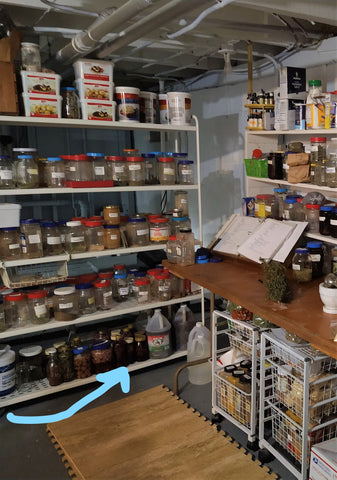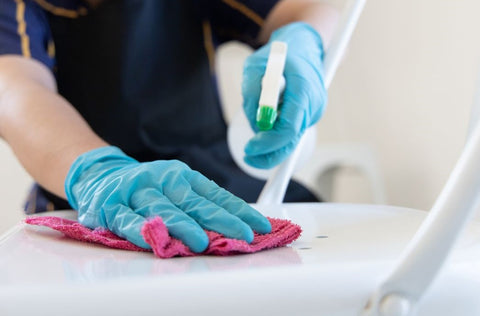As the new growing season arrives, I take stock of my stock. How much vinegar do I have left, what dry herbs are in the lowest supply -- this year rose hips and lemon verbena-- what packaging supplies do I need, how is the rubber band supply?
During this I pull out the racks, sweep and mop the floors, chase cobwebs and find all the empty herb jars and get them washed and sterilized. One of the items I always seem to have in abundance at the end of the year is lemon vinegar. I use it to clean with, so anything left that is not sold from the previous year is repurposed into cleaning supplies for the new year, which is why I always make extra.

The bottom shelf is where I keep the curing vinegar and those gallon jugs are the lemon vinegar, you can see why I might have some left.
Here are a few ideas to use up my lemon vinegar:
- Use to clean the disposal. I pour straight lemon vinegar into ice cube trays and freeze it. Once frozen I drop half a tray of cubes into the disposal and run. It will clean the blades and freshen the drain and kill germs.
- If minerals in hard water are causing your wine or drinking glasses to get cloudy, soak them in the sink with some non-diluted vinegar for a few minutes and wash as normal. The vinegar should dissolve the minerals.
- Combining equal parts water and lemon vinegar in a large microwave-safe bowl. Microwave it for about five minutes to loosen any gunk with the steam, then wipe clean. Make sure to put a chopstick or toothpick inside the bowl—if not, the water can superheat and make the bowl explode!
- Mix 1:1 vinegar to hot water and mop the kitchen floor with it! This will protect your floor from too strong a concentration of acidic vinegar, and will help lift off any grease or dirt, especially around the stove or sink.
- Combine a 1:1 ratio of vinegar and water and place a spray bottle to use to disinfect counter tops and clean other kitchen surfaces.
- Vinegar's acidity helps cut through grease easily. Spray some 1:1 vinegar and water mix onto a splattered stovetop, let it sit for 10 minutes, and then scrub down with soapy water. It should wipe right off. If not, leave it to sit a bit longer.
- After cutting raw meat, it's good to not only wash your cutting board, but also disinfect it with a mixture of water and vinegar. Wipe it down thoroughly with a mixture of vinegar and water.
If you do not have lemon vinegar on hand like I do, use this recipe to create an all-purpose vinegar kitchen cleaner for yourself.

Lemon Herb Kitchen Cleaner
- 2 sprigs rosemary
- peel of two lemons
- 2 sprigs of lemon thyme (optional)
- 2 cups water
- 2 cups distilled white vinegar
Combine all items in a quart jar with a plastic lid and allow to steep for 10 to 14 days. Strain into a spray bottle and use it all over the kitchen for cleaning counters, appliances, sinks and more.
This is a great refrigerator cleaner. It stops mildew and is a no-rinse formula so you can spray and wipe and you are done.
One and Done Refrigerator Cleaner
- 1/2 gallon water
- 1/2 cup ammonia
- 1/4 cup vinegar, distilled white or lemon vinegar
- 1/8 cup baking soda
Mix ingredients together in a bucket. Once the baking soda is dissolved, transfer the liquid to a spray bottle.
To USE: Spray and wipe with a clean cloth to remove mildew stains, and other refrigerator grime.




